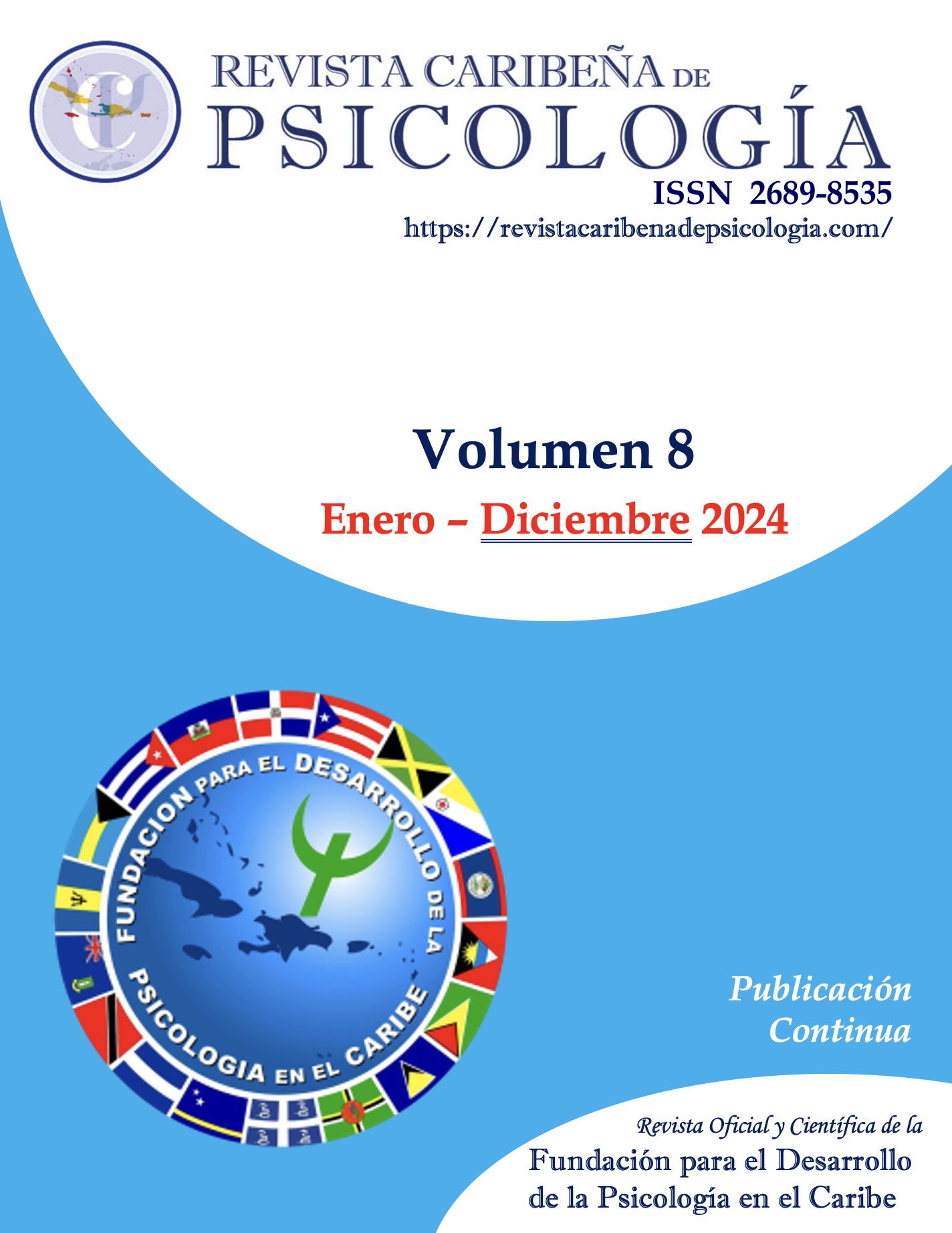Ser Empresario en Puerto Rico: Un Estudio Exploratorio
DOI:
https://doi.org/10.37226/rcp.v8i1.8231Palabras clave:
autoeficacia emprendedora, capital psicologico, control del trabajo, empresarioResumen
Emprender implica identificar las oportunidades para crear y desarrollar proyectos o negocios, asumiendo riesgos y desafíos, y utilizando la creatividad y la innovación para alcanzar el éxito en un entorno empresarial. Los emprendedores son esenciales para impulsar la innovación, crear oportunidades laborales y estimular el crecimiento económico para promover y apoyar el espíritu empresarial. Este estudio tiene como objetivo investigar la relación entre el capital psicológico, la autoeficacia emprendedora y el efecto moderador del control en el trabajo en una muestra por disponibilidad de 110 empresarios en Puerto Rico entre las edades de 21 a 76 años. Los resultados indicaron una correlación positiva significativa entre la autoeficacia emprendedora y el capital psicológico, lo que sugiere que las personas con niveles más altos de autoeficacia empresarial tienen más probabilidades de tener un mayor capital psicológico. Los resultados mostraron que existe un efecto moderador significativo del control sobre la relación entre autoeficacia emprendedora y capital psicológico. Los efectos condicionales observados revelaron que el efecto moderador comienza a manifestarse cuando aumenta el control del trabajo. Cuando los empresarios tienen más control del trabajo, potencian su capacidad para alcanzar las metas, y refuerzan la resiliencia, el optimismo, la esperanza y la autoeficacia.
Citas
Avey, J. B., Luthans, F. & Jensen, S. M. (2009). Psychological capi-tal: a positive resource for combating employee stress and turnover. Human Resource Management, 48 (5), 677-693. https://doi.org/10.1002/hrm.20294 DOI: https://doi.org/10.1002/hrm.20294
Bakker, A.B. & Demerouti, E. (2013). La teoría de las demandas y los recursos laborales. Journal of Work and Organization-al Psychology, 29, 107-115. https://dx.doi.org/10.5093/tr2013a16 DOI: https://doi.org/10.5093/tr2013a16
Baluku, M., Kikoomaa, J. F. and Grace Milly Kibanjaa, G.M. (2016). Psychological capital and the startup capital entre-preneurial success relationship. Journal of Small Business & En-trepreneurship, 28(1), 27-54. https://doi.org/10.1080/08276331.2015.1132512 DOI: https://doi.org/10.1080/08276331.2015.1132512
Bandura, A. (1977). Self-efficacy: toward a unifying theory of behavioral change. Psychology Review, 84(2), 191-215. https://doi.org/10.1037/0033-295X.84.2.191 DOI: https://doi.org/10.1037//0033-295X.84.2.191
Bandura, A. (1994). Self-efficacy. In V.S. Ramachuaudran (Ed.), Encyclopedia of human behav-ior (Vol. 4, pp. 71-81). Academic Press.
Bandura A. (1989). Human agency in social cognitive theory. The American Psychologist, 44(9), 1175–1184. https://doi.org/10.1037/0003-066x.44.9.1175 DOI: https://doi.org/10.1037//0003-066X.44.9.1175
Baumol, W. J. (1990). Entrepreneurship: productive, unproduc-tive, and destructive. Journal of Political Economy, 90(5). DOI: https://doi.org/10.1086/261712
Bockorny, K. & Youssef-Morgan, C. M. (2019). Entrepreneur’s courage, psychological capital, and life satisfaction. Front Psy-chology, 10, 789. https://doi.org/10.3389/fpsyg.2019.00789 DOI: https://doi.org/10.3389/fpsyg.2019.00789
Boyd, N. G. & Vozikis, G. S. (1994). The influence of Self-Efficacy on the development of entrepreneurial intentions and ac-tions. Entrepreneurship Theory and Practice, 18 (4), 63-77. http://doi.org//10.1177/104225879401800404 DOI: https://doi.org/10.1177/104225879401800404
Brough, P., O’Driscoll, M., Kalliah, T., Cooper, C. & Poelmas, S. A. (2009). Job support and job control. Workplace Psychology Health, (6th ed). Northampton. DOI: https://doi.org/10.4337/9781781952672.00011
Bucardo Castro, A., Saavedra García, M.L. & Camarena Adame, M. E. (2015). Hacia una comprensión de los conceptos de emprendedores y empresarios. Suma de Negocios, 6 (13), 98-107. https://doi.org/10.1016/j.sumneg.2015.08.009 DOI: https://doi.org/10.1016/j.sumneg.2015.08.009
Bullough, A. & Renko, M. (2013). Entrepreneurial resilience dur-ing challenging times. Business Horizons, 56, 343-350. https://dx.doi.org/10.1016/j.bushor.2013.01.001 DOI: https://doi.org/10.1016/j.bushor.2013.01.001
Bustillo, I. & Velloso, H. (2015). Puerto Rico: fiscal and economic growth challenges (Studies and Perspectives Series 14). Eclac. https://hdl.handle.net/11362/39166
Champion, D. J. (1981). Basic statistics for social research (2nd ed.). MacMillan.
Chen, C.C., Gene, P. & Crick, A. (1998). Does entrepreneurial self-efficacy distinguish entrepreneurs from manag-ers? Journal of Business Venturing, 13, 295-316. https://doi.org/10.1016/S0883-9026(97)00029-3 DOI: https://doi.org/10.1016/S0883-9026(97)00029-3
Chen, Y. & Zhou, X. (2017). Entrepreneurial self-efficacy and firms’ innovation behavior: the negative mediating role of so-cial capital. An international journal of Social Behavior and Per-sonality, 45(9), 1553-1562. https://doi.org/10.2224/sbp.6734 DOI: https://doi.org/10.2224/sbp.6734
Cronbach, L. J. (1951). Coefficient alpha and the internal struc-ture of test. Psychometrika, 16, 297-334. DOI: https://doi.org/10.1007/BF02310555
De Hoyos Ruperto, M., & Figueroa Medina, C. I. (2011). La edu-cación empresarial como estrategia de competitividad: El reto empresarial en Puerto Rico. Fórum Empresarial, 16(1 Verano), 1-23. https://doi.org/10.33801/fe.v16i1.3738 DOI: https://doi.org/10.33801/fe.v16i1.3738
De Noble, A. F., Jung, D. & Ehrlich, S.B. (1999). Entrepreneurial self-efficacy: the development of a measure and its relation-ship to entrepreneurial action. Trabajo presentado al Comu-nicación presentada en el Frontiers of Entrepreneu-rship Research, Waltham
Field, A. (2018). Discovering statistics using IBM SPSS statistics (5th ed.). Sage Publications.
Fredrickson, B. L. (2001). The role of positive emotions in positive psychology: The broaden-and-build theory of positive emo-tions. American Psychologist, 56(3), 218–226. https://doi.org/10.1037//0003-066x.56.3.218 DOI: https://doi.org/10.1037//0003-066X.56.3.218
Frese, M. (1989). Theoretical models of control and health. In S.L. Sauter, J. J. Hurell, & C.L. Cooper (Eds.), Job Control and Worker Health (pp. 107-128). Wiley
Häusser, J. A., Mojzisch, A., Niesel, M., & Schulz-Hardt, S. (2010). Ten years on: A review of recent research on the Job Demand–Control (-Support) model and psychological well-being. Work & Stress, 24(1), 1-33. https://doi.org/10.1080/02678371003683747 DOI: https://doi.org/10.1080/02678371003683747
Hayes, A. F. (2018). Introduction to mediation, moderation, and condi-tional analysis: A regression-based approach (2nd ed.). The Guil-ford Press.
Hayes, A. F. (2021). The PROCESS macro for SPSS, SAS, and R (ver-sion 4.0) [Computer software]. https://www.processmacro.org/index.html.
Hernández-Sampieri, R., & Mendoza-Torres, C. P. (2018). Meto-dología de la investigación: Las rutas cuantitativa, cualitativa y mixta. McGraw-Hill Education.
Hmieleski, K.M. & Baron, R.A. (2009). Entrepreneurs’ optimism and new venture performance: a social cognitive perspec-tive. Academy of Management Journal, 52(3). https://doi.org/10.5465/amj.2009.41330755 DOI: https://doi.org/10.5465/amj.2009.41330755
Hmieleski, KM. & Carr, J.C. (2007). The relationship between entrepreneur psychological capital and well-being. Frontiers of Entrepreneurship Research, 27(5).
Hobfoll, S. E. (1989). Conservation of resources: A new attempt at conceptualizing stress. American Psychologist, 44(3), 513–524. https://psycnet.apa.org/doi/10.1037/0003-066X.44.3.513 DOI: https://doi.org/10.1037//0003-066X.44.3.513
IBM Corp. (2021). IBM SPSS Statistics for Windows (version 28) [Computer software]. IBM Corp.
Jensen, S.M. (2012). Psychological capital: key to understanding entrepreneurship stress? Economics & Business Journal: Inquires & Perspectives, 4(1). https://nebeconandbus.org/journal/EBJIP2012Jensen
Karasek, R. (1979). Job demands, job decision latitude, and men-tal strain: Implications for job redesign. Administrative Science Quartely, 24, 285-308. https://doi.org/10.2307/2392498 DOI: https://doi.org/10.2307/2392498
Knight, F. H. (1921). Risk, uncertainty, and profit. Houghton Mifflin Company.
Luthans, F. (2002). Positive organizational behavior: developing and maintaining psychological strengths. Academy of Manage-ment Executive, 16, 57-72. https://doi.org/10.5465/ame.2002.6640181 DOI: https://doi.org/10.5465/ame.2002.6640181
Luthans, F. and Youssef, C. M. (2007). Emerging Positive Organi-zational Behavior. Leadership Institute Faculty, 33(3): 321–49. https://digitalcommons.unl.edu/cgi/viewcontent.cgi?article=1007&context=leadershipfacpub DOI: https://doi.org/10.1177/0149206307300814
Luthans, F. & Youssef, C.M. (2004). Human, social and now posi-tive psychological capital management: investing in peo-ple for competitive advantage. Organizational Dynamics, 33(2), 143-60. DOI: https://doi.org/10.1016/j.orgdyn.2004.01.003
Luthans, F., Avolio, B., Avey, J. B. & Norman, S. M. (2007). Posi-tive psychological capital: Measurement and relationship with performance and satisfaction. Personnel Psychology, 60(3), 541-571. https://psycnet.apa.org/doi/10.1111/j.1744-6570.2007.00083.x DOI: https://doi.org/10.1111/j.1744-6570.2007.00083.x
Moriano, J. A., Palací, F.J. & Morales, J.F. (2006). Adaptación y validación de la escala autoeficacia emprendedora en Espa-ña. Revista de Psicología Social, 21(1), 51-64. https://doi.org/10.1174/021347406775322223 DOI: https://doi.org/10.1174/021347406775322223
Márquez, C. & J. Carmona (2011, June 9). Puerto Rico’s biggest problem is the lack of jobs.
The Caribbean Business Plan for the Economic Development of Puerto Rico. Caribbean Business.
McClelland, D.C. (1961). La sociedad ambiciosa: factores psicológicos en el desarrollo económico II. Guadarrama.
Mertens, D. M. & McLaughlin, J. A. (2004). Other quantitative approaches: causal comparative, correlational, single-case, and survey research. En Mertens, D. M., & McLaughlin, J. A. Research and evaluation methods in special education (pp. 69-93). SAGE Publications. https://doi.org/10.4135/9781412985666 DOI: https://doi.org/10.4135/9781412985666.n5
Meseguer-de Pedro, M., Soler-Sánchez, M. I., Fernández-Valera, M. M., García-Izquierdo, M. (2017). Evaluación del capital psicológico en trabajadores españoles: Diseño y estructura empírica del cuestionario OREA. Anales de Psicología, 33(3), 714-721. https://doi.org/10.6018/analesps.33.3.261741 DOI: https://doi.org/10.6018/analesps.33.3.261741
Miao, C., Qian, S. & Ma., D. (2017). The relationship between entrepreneurial self-efficacy and firm performance: a meta-analysis of main and moderator effects. Journal of Small Busi-ness Management, 55(1), 87-107. https://doi.org/10.1111/jsbm.12240 DOI: https://doi.org/10.1111/jsbm.12240
Organización Internacional del Trabajo. (2018). Perspectivas Socia-les y del Empleo en el Mundo: Avance global sobre las tendencias del empleo femenino 2018. https://www.ilo.org/wcmsp5/groups/public/---dgreports/---dcomm/---publ/documents/publication/wcms_619603.pdf
Planning Board (2009). Comprehensive Economic Development Strategy Fiscal Year 2009- 2010. www.jp.gobierno.pr
Peterson, S., Luthans, F., Avolio, B., Walumba, F.O. & Zhang, Z. (2011). Psychological capital and employee performance: a la-tent growth modeling approach. Personnel Psychology, 64, 427-450. https://doi-org.uapr.cobimet.org/10.1111/j.1744-6570.2011.01215.x DOI: https://doi.org/10.1111/j.1744-6570.2011.01215.x
Ringle, C. M., Wende, S., & Becker, J. M. (2022). SmartPLS4 (Ver-sion 4) [Computer Software]. Oststeinbek: SmartPLS GmbH. http://www.smartpls.com.
Rao, L. (2011, October 30). Facebook’s Zukerberg:if I were starting a company now, I would have stayed in Boston. https://techcrunch.com/2011/10/30/facebooks-zuckerberg-if-i-were-starting-a-company-now-i-would-have-stayed-in-boston/
Rivera-Sanchez, C.V., Perez-Santiago, J.A., & Martinez-Lugo, M. E. (2022). Experiencia de una muestra de empleados despla-zados de sus empleos en Puerto Rico: Del desempleo al em-prendimiento. Revista Caribeña de Psicología, 6. https://doi.org/10.37226/rcp.v6i1.6023 DOI: https://doi.org/10.37226/rcp.v6i1.6023
Rosario-Rodríguez, A., & Rodríguez-Montalbán, R. (2019). Modifi-cación laboral a la escala de capital psicológico. Author.
Salanova, M. (2008). Organizaciones saludables y desarrollo de recursos humanos. Revista del Trabajo y Seguridad Social, 47, 179-214. DOI: https://doi.org/10.51302/rtss.2008.5581
Salanova, M., Breso, E., & Schaufeli, W. B. (2005). Hacia un mode-lo espiral de la autoeficacia en el trabajo. Psicothema, 17(2), 339-344.
Salanova, M., Schaufeli, W. B., Xanthopoulou, D., & Bakker, A. B. (2010). The gain spiral of resources and work engagement: Sustaining a positive work life. In A.B. Bakker (Ed) & M. P. Leiter, Work engagement: A handbook of essential theory and re-search (pp. 118-131). Psychology Press.
Schaufeli, W. B., Salanova, M., González-Roma, V. & Bakker, A. B. (2002). The Measurement of engagement and burnout: A two sample confirmatory factor analytic approach. Journal of Hap-piness Studies, 3, 71–92. https://doi.org/10.1023/A:1015630930326 DOI: https://doi.org/10.1023/A:1015630930326
Schumpeter, J.A. (1946). The entrepreneur in economic history. American Economic Review, 58(2), 84.
Seligman, M.E.P. (2000). Authentic Happiness: Using the new positive psychology to realize your potential for lasting fulfill-ment. Free Press.
Stajkovic, A.D. & Luthans, F. (1998). Social cognitive theory and self-efficacy: going beyond traditional motivational and be-havioral approaches. Organizational Dynamics, 26(4), 62-74. https://psycnet.apa.org/doi/10.1016/S0090-2616(98)90006-7 DOI: https://doi.org/10.1016/S0090-2616(98)90006-7
Yousaf, U. S., Hanfiah, M. H., & Usman, B. (2015). Psychological capital: Key to entrepreneurial performance and growth in-tentions. International Research Journal of Social Sciences, 4(9), 39-45. https://www.isca.in/IJSS/Archive/v4/i9/8.ISCA-IRJSS-2015-173.pdf
Wang G.; Li, X.; Zhou, J. & Lan, S. (2020). The influence of entre-preneurial team's cognitive adaptability on its risk decision making. Industrial Management & Data, 120 (20), 329-349. https://doi.org/10.1108/IMDS-03-2019-0178 DOI: https://doi.org/10.1108/IMDS-03-2019-0178
Youssef-Morgan & Luthans, F. (2015). Psychological Capital and well-being. Stress and Health, 31, 180-188. https://doi.org/10.1002/smi.2623 DOI: https://doi.org/10.1002/smi.2623
Descargas
Publicado
Cómo citar
Número
Sección
Licencia
Derechos de autor 2024 Marangely Vázquez-Rivera, Miguel E. Martínez-Lugo, Ramón Rodríguez-Montalbán

Esta obra está bajo una licencia internacional Creative Commons Atribución 4.0.







